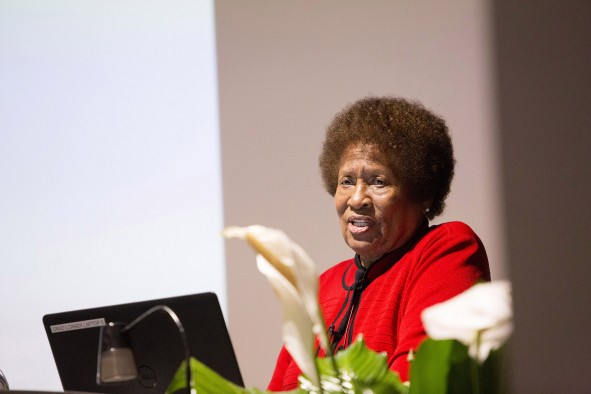Elders Shares Vision for Future During Mary Frances Early Lecture

April 17, 2017
According to Dr. M. Joycelyn Elders, the first African-American appointed U.S. surgeon
general and professor emeritus at the University of Arkansas School of Medicine, that
is the key to a better society. Elders spoke on "Bridging the Gap in Higher Education"at the 17th annual Mary Frances
Early Lecture April 5 at the Georgia Museum of Art.
"We've got to build a bridge that everybody—that all—can get across. The bridge has
to support itself, and so we have to make sure that we build a group of bright young
people for the 21st century who can take of themselves," she said.
Elders emphasized the lessons she learned in her position as director of the Arkansas
Department of Health.
"I saw patients and thought I was a pretty good doctor. But I didn't think about their
home. I didn't think about their environment. I didn't think about where they came
from. I just thought about my taking care of their acute illness, giving them a prescription
and sending them home," she said. "As health director, I learned a lot. I learned
that social environments are far more important than what I thought was my good doctoring."
Elders believes that education and prevention are important to a true health care
system. Teaching people how to take care of themselves helps create a stronger, healthier
society. Her vision for the future includes a patient-centered, prevention-focused,
purpose-driven and solution-oriented health care system.
The event, part of the Signature Lecture Series, is named for Mary Frances Early,
the first African-American to earn a degree from UGA, and her legacy at the university.
Early graduated with a master's degree in music education in 1962 and completed her
specialist in education degree in 1967.
"It's a joy to be here," Early said. "When I reflect on my time here at the University
of Georgia, I can see progress many of you can't see because you have been here when
things were the way they are now. But they have not always been that way, and I can
attest to the fact that we have made a lot of progress."
